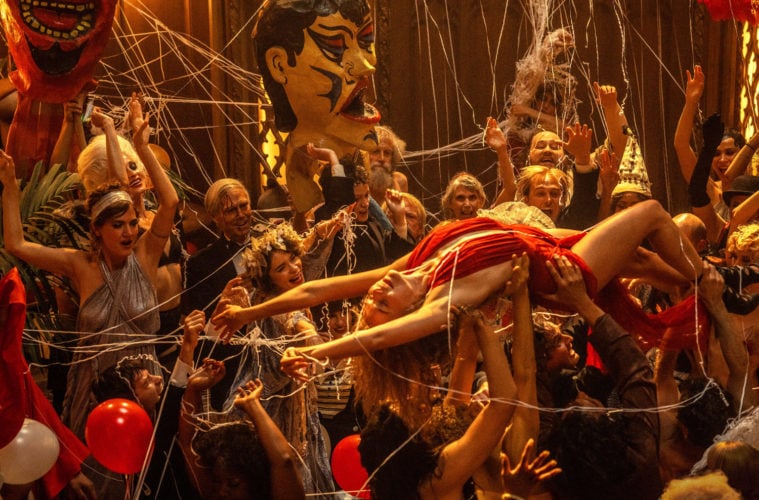 In a movie your coke dealer will love, writer-director Damien Chazelle offers a deep dive into the decadence and depravity of pre-talkies Hollywood. In Babylon, the pantry of the movie star’s mansion contains a range of morphine, opium, heroine and coke org, while orgies are as commonplace as despair. The antithesis of Chazelle’s sweetly melancholy La La Land, Babylon is self-consciously rude and crude–there will be voluminous vomit–and for the first half of its ungainly three hour running time, it creates the best kind of movie high, one generated by the audacity of a filmmaker on a tear.
In a movie your coke dealer will love, writer-director Damien Chazelle offers a deep dive into the decadence and depravity of pre-talkies Hollywood. In Babylon, the pantry of the movie star’s mansion contains a range of morphine, opium, heroine and coke org, while orgies are as commonplace as despair. The antithesis of Chazelle’s sweetly melancholy La La Land, Babylon is self-consciously rude and crude–there will be voluminous vomit–and for the first half of its ungainly three hour running time, it creates the best kind of movie high, one generated by the audacity of a filmmaker on a tear.
Chazelle begins with Manny Torres (Diego Calva), a handsome young Mexican-American who’s been tasked with delivering a circus elephant to the hilltop mansion of a silent film star (Troy Metcalf) clearly modeled on the notoriously debauched Fatty Arbuckle. While the elephant awaits an opportune moment to (literally) crash the party, Manny roams, and finds a bacchanal worthy of the Roman Empire in full decline. As the crowd dances and ruts, unashamedly, a kickass band jams, led by Sydney Palmer (Jovan Adepo), a brilliant trumpeter, who is Black, and Lady Fay Zhu (Li Jun Li), a fearlessly out queer singer. Both characters, and the actors playing them, deserve more story than they get, and linger in the mind much longer than those who get three times as much.
At the party, Manny makes two life-changing friends: Nellie LaRoy (Margot Robbie), a drug-addicted actress who’s never had a role but considers herself a star. “Honey, you don’t become a star. You either are one or you ain’t. I am.” Watching Nellie dance and crowd surf with wild abandon, Manny is smitten for life, and all the more doomed for it. Manny gives a ride home to Jack Conrad (Brad Pitt), a silent screen heartthrob who sees being a movie star as a calling. Manny becomes Jack’s assistant, and sets forth on a path to becoming a Tinseltown power player.
Jack terms a movie set “the most magical place in the world,” and in a long set piece he probably intended to be zanier, Chazelle and a cast of hundreds head to the desert to prove him right. As a German director screams “Faster! Faster!’ and a band pounds out a beat to go to war by, two medieval armies charge as ten silent film cameras roll. Actual blood flies and oops, a guy dies. This picture will provide Nellie her first role (she improvises to dazzling effect) and Manny the chance to save the production while Jack will manage to kiss the girl, on cue against the setting sun. It will be a glorious day for all. Nellie becomes a star while Manny is hooked on movie set magic.
In 1927, Al Jolson stars in a talking picture called The Jazz Singer, which thrills audiences and sends a blast of terror into the hearts of silent stars like Jack, who’s confident he’ll survive this paradigm shift. His efforts to stay in the game will be achingly played by Pitt. Babylon is a frenetic film but its only real feeling can be found in the silent pain in Jack’s eyes as his new reality sets in.
In a scene destined to be classic, Nellie films her first sound scene on a soundstage where even a dropped paperclip can be ruinous. It’s joy free space that is the antithesis of the noisy, freewheeling desert set of the silent epic in which Nellie made her debut. Later, while shooting a two-bit sound film, Jack can’t help but notice that the set is filled with people who aren’t paying attention, who don’t care. The “most magical place” is no more.
Around the time an unhinged Nellie tries to wrestle a rattlesnake, Babylon begins to feel needlessly long, and not even a steady supply of shock scenes can make up for the one-note characterizations of Nellie and Manny. One feels for Robbie and Calva, who make so much of so little and are rewarded with scenes of humiliation for their characters. The film’s final moments, set in a 1950s movie palace, is a daring artistic leap but is wholly dependent on a sweep of feeling that the filmmaker, despite his many gifts, and three hours of razzle dazzle, hasn’t managed to conjure.
Editor’s note: The disclaimer below refers to advertising posts and does not apply to this or any other editorial stories. LA Weekly editorial does not and will not sell content.
Advertising disclosure: We may receive compensation for some of the links in our stories. Thank you for supporting LA Weekly and our advertisers.

